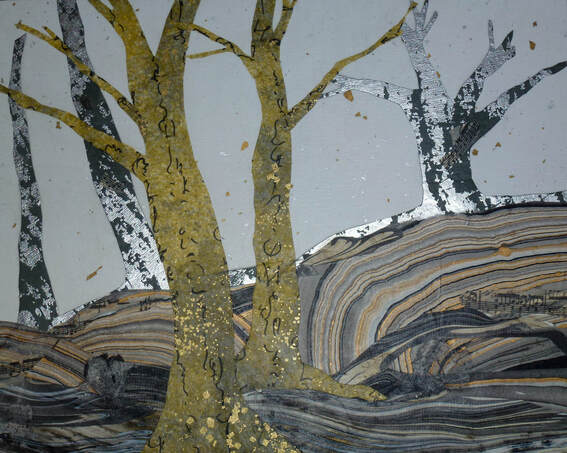The Healing Silence
By Joseph Hutchison
January 15, 2023
January 15, 2023
|
|
… this silence, in which everything
that remained unspoken was somehow shared. —Louise Glück I had an early flight but couldn’t sleep, and so joined my night-owl Dad at the kitchen table. We relaxed a while in the stove-hood lamp’s wan light, sipping day-old coffee stiff enough, he said, to stand a spoon up in. We chuckled, then fell silent— our old habit. How far back did our silence go? I said, “Tell me something I don’t know.” He looked puzzled. “Grandpa,” I tried. “We never met.” “Oh, Dad,” he said. “I remember his hands, his broad back. He liked to lift up big things—sacks of beets, the end of a hay wagon—just to show off. You’ve seen his picture, the one with that tow-headed kid on his lap, the son he had with some other woman. The boy looks maybe five, so Dad must have been about half the age that I am now. Those faded bib overalls with all the pockets, I think he wore them every day, and that greasy gray newsboy cap. His hands there are thick as mine. Thick as yours, too. He worked hard. Of course, they all had to work hard to feed their big families. We were seven—the five girls, my brother Verne and me, the oldest. I was eleven, so when Dad left I tried to look out for the rest. Mother turned to her people, but when she married Dad they cut her off. Y’see, he wasn’t German. So Mother had to take a job at the canning factory. Left us kids with Dad’s Dad— a cruel guy, sick in the head … who one time piled chloroformed rags under our beds to kill us. Mother asked a neighbor who spoke better English to tell the police. When they came knocking, grandpa bolted out the back. And when the policemen saw that Mother spoke German—we all spoke it at home— they called Child Welfare. A few days later a lady came by, and that night we heard Mother cry in her room. Around New Year’s two men showed up, and Mother cried again. The men drove us down to Denver, dumped us in the State Home for Dependent Children. We didn’t know the Home kept Mother from us. Where was she? What was she doing? Days went by. Weeks…. When May came, the Home sent me to live with a family over in Montrose. I worked there five years, and came to feel they were my people, even though they made me sleep in the barn because they had a young daughter. The year I turned sixteen they sent me back. Broke my heart…. All those years we had no idea where our Mother was. I like to think she kept fighting for us. The Home told us nothing, even after Mother caught TB. It took her fast, I heard later. Heard her people gave her a decent funeral service. I sat by her grave at Fairmount once. Well, with Mother gone, the Home adopted us out— except for me. Who wants some teenage boy around causing trouble? At least I got to keep our name. The rest got other names. I went on to high school, milked cows at the Home at dawn and dusk, earned a diploma. Later I ran away and rode the rails. After a while I joined the Navy—and like the posters said, I saw the world. But that’s another story. After the war, I started trying to find my real family. All those changed names made it take ten years, but in the end I found them. Every last one,” he said, then looked away, eyes damp. He flashed a thin, joyless smile. And then the healing silence came and spoke for us again. |
Joseph Hutchison, Colorado Poet Laureate (2014-2019), has published 20 collections, most recently Under Sleep’s New Moon; The World As Is: New & Selected Poems, 1972-2015; and Marked Men. His poems have appeared widely in journals—including Adirondack Review, New York Quarterly, Naugatuck River Review, and Pedestal—and in numerous anthologies, including New Poets of the American West and A Ritual to Read Together: Poems in Conversation with William Stafford. He directs the Professional Creative Writing online program at the University of Denver’s University College and lives in the mountains southwest of Denver.

